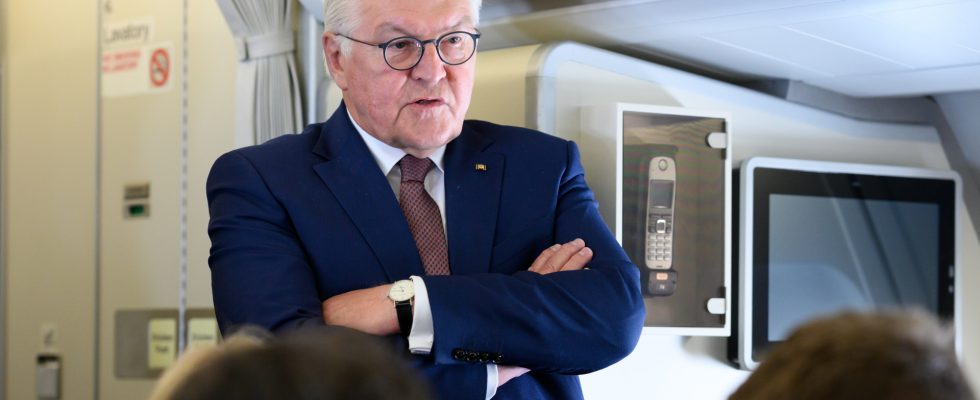Status: 04/19/2023 05:41 a.m
Today, Federal President Steinmeier commemorates the uprising in the Warsaw Ghetto together with Poland’s President Duda. The relationship between the two countries is currently quite difficult.
SPD politician Axel Schäfer does not want to speak of an ice age in German-Polish relations. Ice age would be if there were no functioning relationships at all levels. In the economic area, however, one has “many very good relationships” and also “a lot of exchange in society”. It is only politically difficult with the ultra-conservative PiS government.
Schäfer was in Warsaw with a delegation from the German-Polish parliamentary group. There he was allowed to listen to Polish Foreign Minister Zbigniew Rau, who had little flattering to say about Germany in a three-hour keynote address.
For Schäfer, the convinced European and former MEP, this time it was “particularly sad to realize that an attempt was then made to settle accounts with Germany”, which even cast doubt on Willy Brandt’s policy of détente.
Parliamentary elections in autumn
Poland’s politicians are in campaign mode – parliamentary elections are in autumn. And above all the PiS and its chairman Jaroslaw Kaczynski like to profile themselves with anti-Germany and anti-EU slogans. Discussions between Germans and Poles take place behind closed doors in a good atmosphere, but in public, harsh, sometimes shrill tones prevail.
Dietmar Nietan from the SPD is the coordinator for German-Polish cooperation. He speaks of a “scissors in the head”. “Anyone who attracts attention to PiS President Kaczynski as a friend of Germany has no chance in the PiS, and that causes the biggest problems,” Nietan regrets.
This was also recently shown in the case of the environmental pollution on the Oder, when Polish authorities hesitated for a long time before contacting their German colleagues to inform them about the disaster. Both sides would have wanted to learn from mistakes and misunderstandings. Nietan thinks communication is better now.
The CDU MP Paul Ziemiak is chairman of the German-Polish parliamentarian group. His verdict on the Polish government is somewhat milder than Schäfer’s: Poland wants a partnership of equals. And that is something that people in Germany pay too little attention to. Sometimes, Ziemiak regrets, there are no signs that German governments are taking Poland seriously.
For example, when German chancellors, contrary to all Polish warnings, cling to cheap Russian gas or Nord Stream for a long time – or when Olaf Scholz travels by train through Poland to Ukraine without asking the Polish president.
Poland caught between Russia and the EU
However, the Russian war of aggression in Ukraine has brought some rapprochement. This is how Nietan describes it. In the meantime, communication on all topics affecting Ukraine is significantly better than at the beginning of the Ukraine war. Not only when it comes to arms deliveries, but also on the question of coordination within the EU on the prospect of accession or cooperation on humanitarian issues between Warsaw and Berlin.
While Poland initially refused to install German Patriot air defense systems in the south-east of the country, cooperation is now much faster. This was very clearly observed recently with the delivery of five MiG fighter jets from former GDR stocks to Ukraine, which the federal government approved at record speed.
The Ukraine war has thrown the PiS government into a dilemma, Nietan observes. On the one hand, they see themselves firmly in NATO as a bulwark against Russia and also support the sanctions within the EU. On the other hand, the PiS has been pursuing a destructive policy against the EU Commission for some time, which, according to Nietan, is a “Trojan horse for the German hegemon”.
Concern about human rights, women’s rights, minority rights
The Greens politician Nyke Slawik, who is also a member of the German-Polish parliamentary group, is very concerned about the restricted freedom of the media, the repression of women who want to have abortions and minorities such as the LGBTQ community. According to the European human rights organization ilga europe, Poland has been in last place within the EU for LGBT rights for several years – behind Hungary.
The civil society issues in particular, the tightening of abortion laws and the restructuring of the judicial system by the PiS have triggered a lot of criticism in Germany. Nevertheless, Slawik also says: “We need Poland, and the Poles need us.” At the same time, there are strong reservations about the Germans in Poland, above all the lack of processing of the atrocities and crimes that were committed in the Second World War and which the Polish government continues to address.
wounds of the past
And then there are the wounds of the past. Nietan makes it clear: there will be no reparations payments, as repeatedly demanded by the Polish side. However, this does not apply to gestures of goodwill and reparation.
Against the background of the unprecedented crimes against humanity that Germans often committed on Polish soil in the period between 1939 and 1945, Nietan sees a lot of room for improvement for corresponding gestures, which in the end would also have to cost German taxpayers money.
Nietan is thinking here of a future fund or the question of whether certain Polish cultural assets that were destroyed in World War II can be rebuilt with German money – like the Saxon Palace in Warsaw. These are gestures that not only the PiS government, but politicians from almost all Polish parties expected from Germany. At least that could help to initiate a thaw in German-Polish relations.

